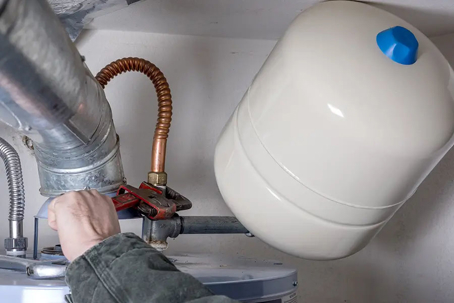Did you know that nearly 75% of water heaters fail due to lack of proper maintenance? As a homeowner in Northbrook, IL, you can’t afford to overlook this essential aspect of home care. Regular upkeep can extend your water heater’s lifespan and improve efficiency. But what are the specific steps you should take? Let’s explore the must-know maintenance tips that can save you time and money.
Understanding Your Water Heater System
When you understand your water heater system, you can identify issues before they become major problems.
First, familiarize yourself with the type of water heater you have—whether it’s tankless, storage, or heat pump. Each type operates differently and has unique maintenance needs.
Next, pay attention to the temperature settings; the ideal range is typically between 120°F and 140°F. This not only guarantees comfort but also prevents scalding.
Regularly check the pressure relief valve; it’s a critical safety feature that prevents excess pressure buildup.
Also, inspect for leaks and corrosion around the tank and connections. If you notice any changes in water temperature, pressure, or quality, it’s time to investigate further. Additionally, consider scheduling frequent inspections to catch potential issues before they escalate into costly repairs.
Regular Maintenance Practices
Regular maintenance is key to keeping your water heater running smoothly and efficiently.
Start by flushing the tank at least once a year to remove sediment buildup, which can affect performance. Check the temperature setting on the thermostat; it should be around 120°F for ideal efficiency and safety.
Inspect the anode rod every couple of years and replace it if it’s greatly corroded. This rod helps prevent rust inside the tank.
Don’t forget to examine the pressure relief valve to verify it’s functioning properly. Test it by lifting the lever; water should flow out without any leaks.
Finally, keep the area around your water heater clear of debris and flammable materials. Following these simple maintenance practices won’t only extend the life of your water heater but also improve its efficiency, saving you money on utility bills in the long run. Additionally, consider high-efficiency hot water systems like tankless water heaters, which can further reduce energy bills by heating water only when needed.
Signs Your Water Heater Needs Repair
If you notice a sudden increase in your energy bills or find that your water isn’t heating as it should, it might be time to contemplate that your water heater needs repair.
Watch for other signs, like strange noises coming from the unit—banging or popping sounds can indicate sediment buildup.
Additionally, if you see water pooling around the base of the heater, it could mean a leak, which shouldn’t be ignored.
You should also pay attention to fluctuating water temperatures; if your showers go from hot to cold unexpectedly, it’s a red flag.
Finally, if you smell gas or detect a rotten egg odor, shut off the unit and contact a professional immediately.
Recognizing these signs early can save you from costly repairs down the line and guarantee your home remains comfortable and safe.
For urgent repairs, remember that emergency plumbers are available 24/7 to assist you in resolving your water heater issues promptly.
Don’t hesitate to reach out for help when you notice these issues.
DIY Troubleshooting Tips
How can you effectively troubleshoot your water heater before calling in a professional plumber?
Start by checking the power source. If you have an electric heater, confirm it’s plugged in and that the circuit breaker hasn’t tripped. For gas heaters, confirm that the gas valve is open.
Next, inspect the thermostat settings; they should be set to the desired temperature, typically around 120°F.
Listen for unusual noises, as these can indicate sediment buildup or other issues. If you notice leaks, check the connections and valves for any signs of wear or corrosion.
Additionally, run hot water in a faucet. If it runs cold unexpectedly, it might signal a problem with the heating element.
Finally, examine the pressure relief valve; if it’s leaking, it may need replacement. Remember, water leak detection services can help identify issues that may not be immediately visible, ensuring your system operates efficiently.
When to Call a Professional
Knowing when to call a professional can save you time and prevent further damage to your water heater.
While DIY troubleshooting is great, certain signs indicate it’s time to reach out for help.
Don’t hesitate if you notice:
- Leaks that could lead to mold or structural damage
- Strange noises that disrupt your peace and indicate mechanical issues
- Inconsistent temperatures affecting your comfort and daily routine
- Foul odors that could signal gas leaks or other dangerous issues

Conclusion
Taking care of your water heater is like nurturing a garden; with regular attention and care, it’ll flourish and serve you well. By staying on top of maintenance and being alert to any warning signs, you can avoid costly repairs and keep your hot water flowing smoothly. Remember, it’s always better to address issues early than to wait for a drought. So, roll up your sleeves and give your water heater the care it deserves!

